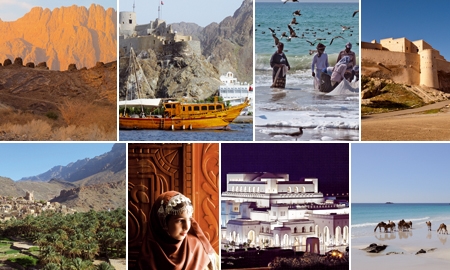The year 1970 marks one of the most significant milestones in Oman’s history. It was in that year that His Majesty Sultan Qaboos bin Said took over the reins of the country and set the country on a course of major social reforms, administrative modernisation and openness to the outside world. The past four decades under His Majesty the Sultan’s leadership have had such a positive impact on the country that the period has been termed the “Blessed Renaissance”.
Indeed, in late 2010 the United Nations Development Programme (UNDP) conducted a survey of 135 countries worldwide, measuring their progress in health, education and income according to the Human Development Index. The report named Oman as the nation most improved during the preceding 40 years.Not content to rest on his laurels, His Majesty the Sultan continues implementing reforms to raise quality of life. For example, uprisings in Oman during the Arab Spring were soon quelled with the government’s vow to provide Omanis with 50,000 new jobs in the public and private sectors, as well as with unemployment benefits in the meantime. Other novelties were an increase in the number of scholarships available to Omani students.
Also in 2011, His Majesty the Sultan made modifications to the political structure; by amending the Basic Law of State, he gave citizens more say in the country’s governance. Reforms such as this are hinting that Oman is gradually shifting away from the current system of administration and towards a constitutional one.
Considered a haven of peace and stability in the region, Oman’s foreign policy is one that seeks regional stability and cooperation.
As Yousuf Bin Alawi Bin Abdullah, Minister Responsible for Foreign Affairs, puts it: “The fundamentals of the Sultanate’s policy in its relations with other countries are based on dialogue and mutual respect.” Consequently, Oman remains one of the few countries that have maintained friendly ties with Iran, and as such, has served as a diplomatic tie between the latter country and the rest of the world. In fact, Oman helped facilitate the September 2011 release of North Americans and Europeans who had been detained by Iran.
While not turning its back on its giant neighbour across the Arabian Gulf, Oman does embrace moderation. His Majesty the Sultan, in his October 2011 speech to the Council of Oman, said: “As the monopolisation of opinion and its imposition on others should not be permitted, radicalism and immoderation should also not be tolerated because all that will disturb the required balance upon which wise decisions that consider the interests of all were based.”
Every nation that desires to live… needs to roll up its sleeves and work tirelessly and diligently with dedication and the love to give generously… His Majesty Sultan Qaboos bin Said, Sultan of Oman |
The last 42 years under His Majesty the Sultan’s rule have also witnessed strong economic growth, due in no small part to the oil and gas sector. The government expects to receive $22.8 billion in revenues, nearly 70% of which will stem from oil sales and another 12.5% from gas exports. Nevertheless, Oman is joining the ranks of many other oil states in the pursuit of a more diversified economy. By 2020, the Sultanate plans for the oil sector to contribute just 9% to total gross domestic product (GDP), which grew by a healthy 5.5% last year, reaching $71.89 billion.
In its Eighth Five Year Plan (2011-2015), the government is promoting non-oil exports and is increasing spending on infrastructure projects. According to the Ministry of Finance, more than $17.9 billion has been allocated to new projects to date, including the building of five hospitals, 29 schools and the Al Batinah Expressway, as well as for new infrastructure on the Samail, Ibri and Duqm industrial estates, and for the implementation of scientific research and information projects.
His Majesty the Sultan has Oman’s present and future at heart, and in his speech called on the people to participate in laying the groundwork for a better future.
“Therefore every nation that desires to live – in the full meaning of the word – needs to roll up its sleeves and work tirelessly and diligently with dedication and the love to give generously to utilise its capacities and skills and invest in its resources and potential, so that it can build a great and illustrious present and prepare for a decent and prosperous future.”

0 COMMENTS